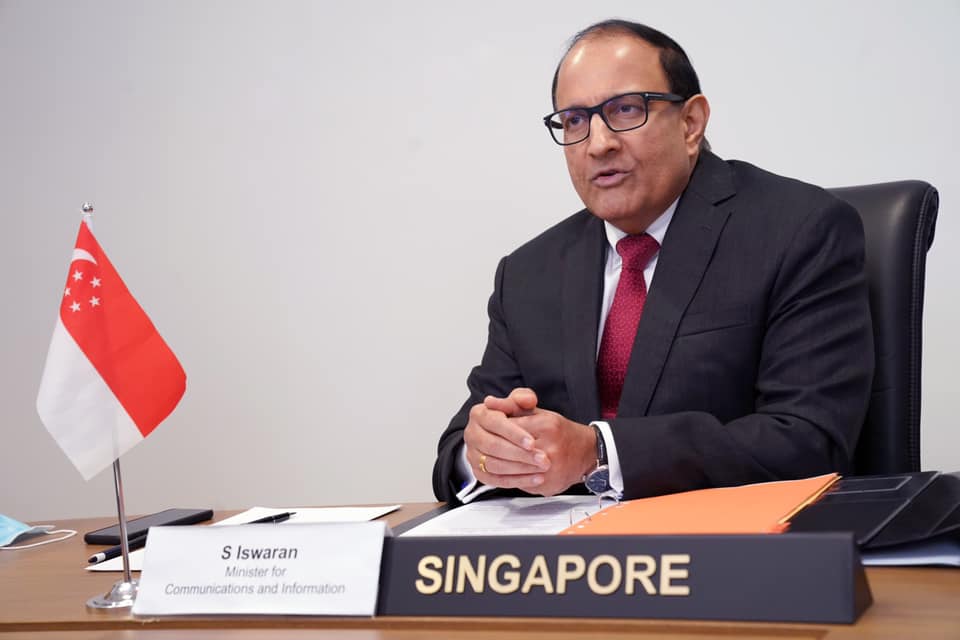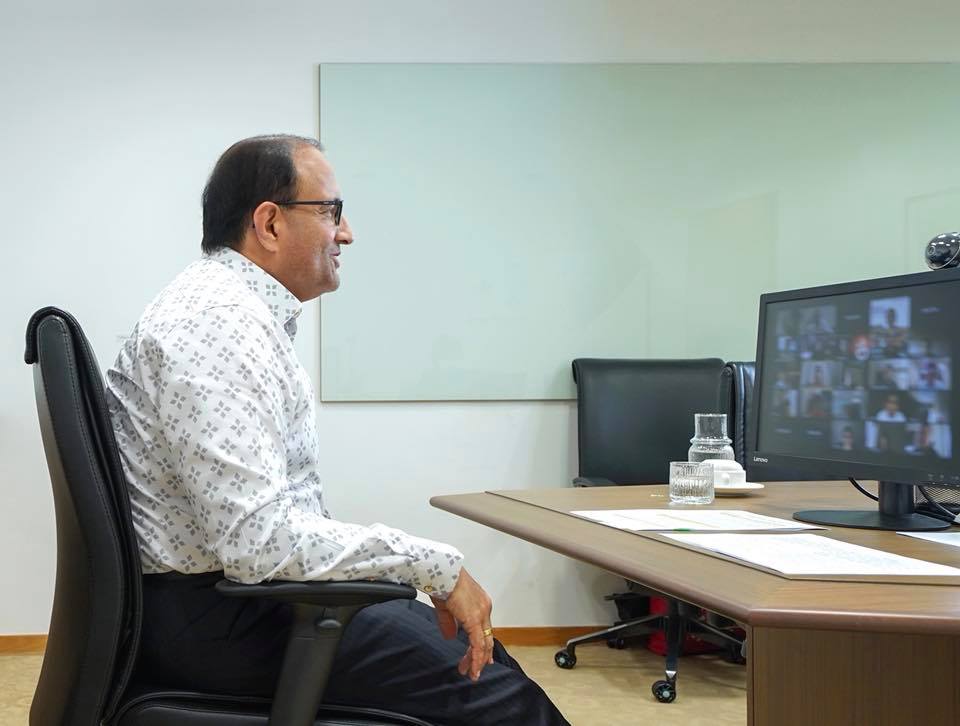The year 1997 saw the beginnings of the Asian Financial Crisis.
The Southeast Asian and East Asian region fell into unprecedented chaos, as financial systems struggled to cope with the economic fallout.
It was sparked by intense speculation that the Thai Baht was overvalued. And it was in that year the baht was eventually devalued by about 15-20 per cent. It immediately plunged against the US dollar.
The economic cost was heavy, and it didn't stop at Thailand's borders. The crisis sparked a "contagion" affecting investor confidence that would envelop all of Southeast Asia and beyond.
Singapore was not spared, Singapore's GDP took a nosedive from the previous year's 8 per cent growth to 1.5 per cent in 1998. Unemployment reached 3.2 per cent in 1998.
A S$10.5 billion aid package was pushed out, following an earlier S$2 billion package. This was accompanied by a host of other measures, including cutting CPF contribution rates and reducing rent for businesses.
A relatively young Iswaran enters parliament
It happened to be this very year that a 34-year-old S Iswaran found himself elected into Parliament as a reasonably fresh-faced former civil servant.
A Colombo plan scholar, Iswaran told Mothership that he was a beneficiary of "how government policies make a real difference in the lives of our people", as "the possibility of overseas education was never really on the cards for me".
He explained that he decided to enter politics because he wanted to ensure Singapore continues to offer such hope and opportunities for "each and every Singaporean, no matter of what background".
One might expect him to be well-primed for entry, timing-wise — by this point, he had followed a decade-long path and progress through the civil service.
Young Iswaran graduated from the University of Adelaide, after "stumbling" into reading economics at National Junior College (he started with further mathematics, then switched to biology and finally settled on economics after getting bored of staring into microscopes and drawing cells he wasn't actually able to see in his samples).
But it turned out to be a meaningful step for him, even though he admits he never really felt like any of the work he did initially constituted things he had studied or prepared himself for: policing strategies, policies in prisons, redeveloping schools like Crescent Girls', setting up the NTUC's first preschools (then called NTUC Childcare Cooperative) and SINDA too.
And then, at the Ministry of Trade and Industry — where he would in 2015 return to helm for about two and a half years — he was eventually invited to tea with then Deputy Prime Minister Lee Hsien Loong, also his former boss for a time.
20 years later
Over 20 years later another contagion, a lot more literal this time, is affecting the globe.
The economic stats are worrying, to say the least.
A projected 4 per cent contraction in GDP for Singapore, entire sectors grinding to a halt, and a possible 100,000 Singaporeans unemployed in 2020, over 20,000 more than in 2019.
As Singapore slowly prepares for a possible exit to Phase 2, one of the most pressing issues on Singaporeans' minds will be jobs.
Prime Minister Lee underlined this in his recent 22-minute speech.
"Third, we have programmes and plans to cope with the challenges before us. The government’s biggest priority now is jobs — helping Singaporeans to keep their jobs, or find new ones."
Whether it be about finding them as a fresh grad, retaining them in the face of economic uncertainty, or making a mid-career switch after layoffs.
While it is easy to compartmentalise the idea of job loss into numbers and percentages, the effect of those losses run deeper than just economic well-being.
The prospect of a significant portion of our population losing their jobs has the potential to tear apart both the interpersonal and social fabric of a country.
Back when the Asian Financial Crisis tore through the region, suicide rates for some Asian countries shot up.
According to a Reuters article from 2009:
"South Korea’s suicide rate nearly doubled during the Asian financial crisis 10 years ago with experts blaming it on stress caused by job and income losses."
A study in 2009 showed that suicide rates for males in 1998 in some of the affected Asian countries went up significantly.
"Compared to 1997, male rates in 1998 rose by 39 per cent in Japan, 44 per cent in Hong Kong and 45 per cent in Korea; rises in female rates were less marked. Male rates also rose in Thailand, but accurate data were incomplete."
One of the countries that did not see that drastic a spike in suicide rates was Singapore. The study noted the smaller impact the economic crisis had on us and Taiwan.
But with many calling this the worst-ever economic crisis to hit the globe, Singapore included, the looming threat of a rise in unemployment once more naturally begs the question of the Singapore government's efforts to mitigate this.
Measures implemented and proposed
 Source: S Iswaran Facebook page.
Source: S Iswaran Facebook page.
As most of us now might at least have a vague idea, there's already been myriad measures implemented by the government.
Building satellite career centres in every HDB town in Singapore, a S$2 billion jobs and training package, and a National Jobs Council chaired by Senior Minister Tharman Shanmugaratnam to oversee its administration to boot.
The government has promised to create more than 40,000 jobs for 2020, by scaling up the SGUnited Jobs Initiative, Minister for Manpower Josephine Teo said in Parliament on June 4.
Despite all these, it remains to be seen just how much it can prepare Singapore against a sustained global financial downturn.
While everyone is affected, the nature of Covid-19 means some industries are much more affected than others.
Industries like tourism and aviation have been decimated, while others have weathered the storm considerably better.
One of the latter is the digital sector.
Iswaran told the parliament on June 4 that "the ICT sector remains one of the bright spots in our economy", with the sector expanding by 3.5%, and adding 1,100 new jobs in the first quarter of 2020.
How to make jobs
And so, it was jobs we found ourselves talking about with Minister Iswaran, when we connected over Zoom for an interview with him this week — in particular, the issue of jobs in a tumultuous Covid-19 world.
A world which he described as holding "deep uncertainty" for not only those who are taking their first plunge into the working world, but those in the middle of their careers struggling against the rising tides of unemployment and layoffs.
"Jobs, jobs, and jobs" — the three key focal points for the government according to Iswaran, a mantra he says had been touched on by his Cabinet colleagues in parliament.
Iswaran himself was also in the most recent parliament sitting to talk about jobs and opportunities in the digital sector at the recently-concluded fourth Budget debate last week.
Over 5,000 jobs in the pipelines over the next two to three years are promised.
Now, while that might not seem like too much of a safety line in the face of all that Singapore might go through (Monetary Authority of Singapore projections predict hundreds of thousands of job losses), Iswaran argues there is an interesting quirk to the digital sector (specifically the infocomm media sector) in Singapore, and very much the world.
"So one of the promising areas is obviously the Infocomm Media sector. The interesting thing about it is it's both a vertical, in the sense that you have ICT companies, they're doing or media and doing that well. But it's also a horizontal in the sense that every sector is doing it every sector is going digital."
Basically, Iswaran makes the case that nearly every other sector will need to engage with the digital side of things in order to make their business tick, or at the very least amplify it.
That is a lesson some eateries and hawkers have have learnt the hard way, as dine-in options ceased and online delivery services and capability became essential.
In some ways, the breaking down of a long-established ecosystem might have best emphasised the need to adapt to a new one.
"The other side of it is the digitalisation push, where we are doubling down on this, because we want to use this opportunity when people are not just aware, but they feel palpably the value of it. We want to use this opportunity to raise us to a higher trajectory on digitalisation."
To aid in helping some make the shift over to digitalisation, 1,000 digital ambassadors will be hired.
Which itself presents a pertinent question.
What is a job?
 Source: S Iswaran Facebook page.
Source: S Iswaran Facebook page.
There's been a concerted push to boost the number of jobs in various industries.
This, however means the sector with job vacancies might not be the one that the affected Singaporeans trained, or studied for. The sectors might even be drastically different from the ones some might have worked in for years prior to being let go.
The elder of two children from a household that always had more well-meaning adults than young people, Iswaran describes himself as one who is open to opportunities and followed where they go (ahem, or where his parents wished him to go), as opposed to many of today's fresh graduates with more definite ideas of exactly what they wanted to do with their lives and degrees or diplomas.
But this experience of being open "to what life gives you", he says, came coupled with learning values of education, hard work and empathy for people — all things he says helped him in understanding the significant uncertainty fresh graduates hoping to enter disciplines along the lines of those they majored in are facing now.
The issue of starting salaries has also been brought up in national discourse recently.
A Today article featured a 28-year-old quantitative finance major expressing his shock at an initial offer of S$2,800 he got from a company he interviewed for — he was expecting S$3,800.
Another Today article four days later focused on how "A low starting salary for first job won’t affect the rest of fresh grads’ career".
Comments on this piece featured more than a few sceptics over that particular statement.
Which brings us back to the Digital Ambassador position.
The salary for this position will range from S$1,800 to S$2,100.
According to a Straits Times article quoting Iswaran, the job will be available for a spectrum of people:
- "Young people like, for example, graduates from ITE or polytechnic or university, who can bring one perspective and an important set of skills to the table," or
- "people who are in mid-career type of age range, or maybe even older, because they will have both the experience of having had this journey, and perhaps a different way of communicating with this target segment."
Which begs the question, how will the salary offered entice the people mentioned above?
Iswaran first clarifies what a digital ambassador actually does, dispelling the notion that it is a particularly tech-heavy position, although of course there will be training for the ambassadors to better understand the product they will be introducing.
"They're going to be in a sense the digital frontline for us. Talking to hawkers, talking to seniors, understanding what they need and how we can help them in this journey. In other words, we want them to know that they don't have to walk the journey alone, because many of them are nervous, shy, concerned and so on. So, we don't necessarily need super tech-oriented persons.
But we need people who are empathetic, they can understand, because the people you're dealing with are very diverse; their concerns and needs are diverse. So whether you're an ITE grad, Poly grad, University grad or a more mature person, what we need are people ambassadors who can relate to this."
And it is this particular trait, and the chance to interact with this diverse a base that Iswaran deems the most valuable to a digital ambassador's future employment and personal growth, despite the salary maybe not being "as high as they would have liked":
"If there's a need on the ground. But what do they stand to gain from it? I think the one of the most important things that they will pick up is the ability to connect with this very diverse clientele. Because if you think about most jobs, when do you need to deal with an 80-year-old who speaks Hokkien?
Or a 50-year-old hawker who has got very basic issues that he wants to talk to you about, without getting into all the very technical aspects and things like that. So, I think you pick up valuable communication, and I think empathy skills, which are going to be vital in almost any kind of work situation that you're involved in."
And perhaps that speaks to what is at the core of rallying a nation through a crisis.
More than jobs
Whether it be promises of salaries at your first job not determining the rest of your career, up-skilling efforts to adapt to a digital world, or slowly building up a digital ecosystem, or even promoting 25,000 traineeships and 30,000 skills-training opportunities, all these are not just focusing on making it through the present.
They are commitments that will serve in some way in preparing for the future.
The underlying narrative those in power have to successfully convey to the people is that the future will be a better one. That to get through the tumultuous now, there has to be a vision of a better later.
And that might be tough while people are in the midst of hardship, and facing a hugely uncertain future.
And it is a situation Iswaran is familiar with.
Just one year after he entered parliament, Singapore faced an almost unthinkable financial disaster.
"But here's the thing I want to just share with you. In 1998, we had the Asian Financial Crisis. Yeah. And it looked like that was something that was just unthinkable, and it became a huge challenge. But, you know, eventually you come out of it."
That same fear and uncertainty presented itself again in 2008, when the global financial crisis struck. Back then Iswaran recalls thinking "you can't see the bottom of this thing" due to the interconnected nature of the global economy.
And now, there is Covid-19.
"So, if you ask me, I think, for a young person, the first thing I would say is, from experience, and with deep conviction I will say this 'this too will pass'.
But the point is this too will pass — but in this time before it passes, what we do is going to define us and prepare us for the future."
To come out stronger from the crisis, he talks about the need to take advantage of Covid-19 as a potential "opportunity", a choice of words he himself admits is rather ironic.
"Practically every decade, you know, we've had some kind of major challenge. But the key thing is, and this is I must say, this is unprecedented on many levels, but I have the same deep conviction that we can overcome this.
But if we really want to come out of this stronger, we need to take full advantage of the opportunity. It's an ironic word, but it is an opportunity for us as well."
An opportunity for later.
The Mothership Covid Interviews is a series of conversations where our young writers sit down with key figures in Singapore to talk about the ongoing pandemic, its effects on Singapore’s society, economy and polity, and how the folks we talk to are coping, or helping Singaporeans cope. And in some cases, we talk about fun stuff too.
Top photo via Iswaran's Facebook and Zheng Zhangxin
If you like what you read, follow us on Facebook, Instagram, Twitter and Telegram to get the latest updates.
